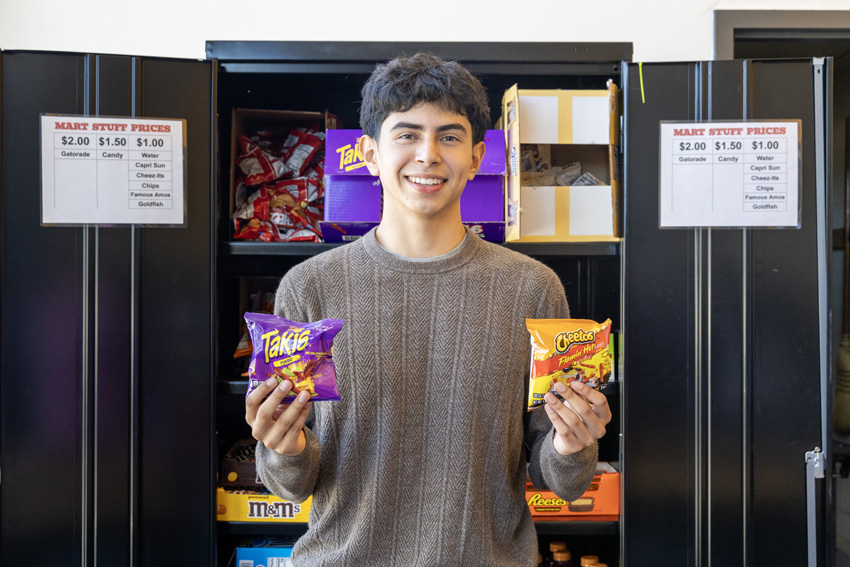College Corner is a column about all things college, covering everything from college preparation to tips on application. A new column will be posted on the first or second Wednesday of the month.

For this column I turned to my colleagues from local colleges and universities to offer some words of wisdom when it comes to college applications. These experts have reviewed hundreds of applications. They are aware of the standout qualities that distinguish qualified students from the rest and also the common mistakes causing applicants to get turned down.
Upon posing the question, “What advice do you have for seniors who are starting the application process?” the answers I received were very similar. Nearly every professional talked about the importance of being prepared and organized.
David Navarro, college relations specialist from Willow International has some great advice.
“Get a binder with colored tabs and have each tab represents a college where you are planning to apply,” Navarro said. “Everything you receive from that college goes in that binder under the tab reserved for that college/university.”
He also cautioned that if a college representative has the impression that you are unorganized they could think twice about your admission.
It is also essential to have your application reviewed by another set of eyes before it is submitted. As with any written document it is important to have an objective party scan for grammatical errors, typos and inaccurate self-portrayal.
Toby Garza, admissions counselor and adjunct faculty from Fresno Pacific University talks about submitting an application free of mistakes and also one that correctly addresses the questions asked.
“Read the essay prompts carefully and more than once,” Garza. “I have seen many students answer the prompts incorrectly. Students often make mistakes that could have easily been avoided by slowing down and devoting more time to the written portion.”
Taking the time to submit an application that you are proud of and properly reflects you is very important. Admissions officers do not have time to conduct personal interviews with every applicant, which is why the prompts are your time to shine. These sections give students the opportunity to demonstrate why they should be accepted over other applicants.
“Students often fail to make the personal statement personal,” David Loveless, admissions counselor at University of California, Santa Barbara, said. “The essays need to give us a sense of the applicant?s personality. Students should make sure they are talking mainly about themselves, not just a hero or role-model.”
Although the essays require the most time and consideration, the other sections are also important and should not be overlooked. Here are a few common application mistakes that were mentioned by the professionals.
&%picture2placement%&
A common issue is not accurately inputting a student?s classes (not indicating AP and honors classes, incorrect placement of classes in A-G categories, etc.) and not including SAT/ACT scores since they are retaking the tests can be a problem.
Loveless says students often neglect to check the box in the ?Parent Clause? on page five of the UC application, which allows the school to give information to parents if they call with questions regarding their student.
Navarro has seen students forget to click the “Submit my Application” button when they are done with the SCCD application, which can create a huge delay in the process and may ultimately cause them to miss the priority registration deadline.
When completing the application forms, students often become overwhelmed by the amount of information that is required of them to fill out. Although this may be true, it is important to complete the forms correctly and completely. Omitting some requsted information can also cause delays and possibly even denial of acceptance.
Delma Garcia, outreach counselor and supervisor of the Ambassador Program at California State University, Fresno, talks more about this issue.
Delma says students need to be prepared to answer questions relating to family income, size of family, date parents moved to California, if parents are California residents and student?s social security number.
Students are often hesitant to give out their social security number but Navarro warns that this is necessary in order to match students to their financial aid application. This information will not been seen by anyone other than the school personnel and is only used on a secure website.
With most college applications due in just days or weeks from now, my hope is that students feel more prepared then ever to take on this endeavor. Teens are now aware of the common pitfalls they can fall into and now students have the advice from expects in their field to complete the process.
Remember that campus are not alone in this process; there are people out there who are willing to answer any questions they may have. The only dumb question is the one not asked, so please, ask away.
For more College Corners, read the Oct. 26 article, College Corner: College application options
For more opinions, read the Nov. 8 article, Junior discusses nationality, ethnicity.





